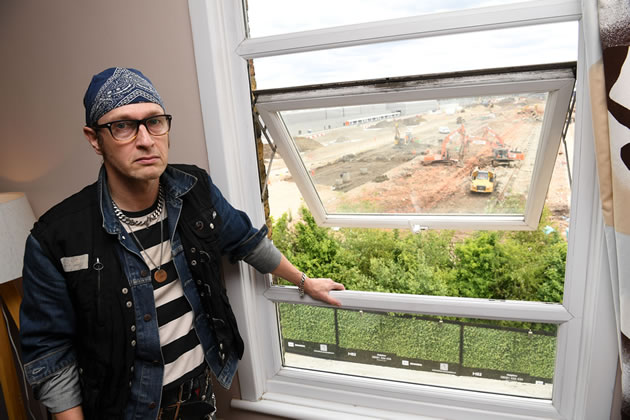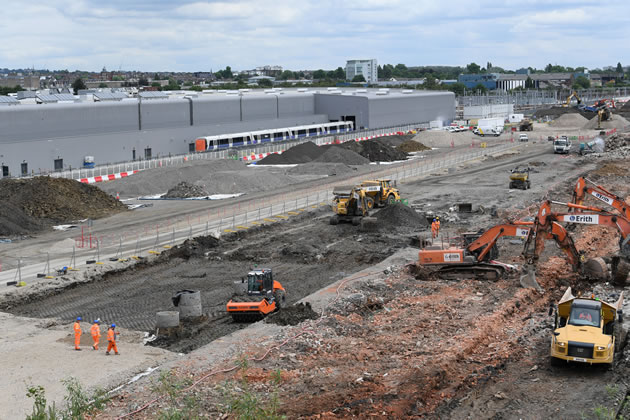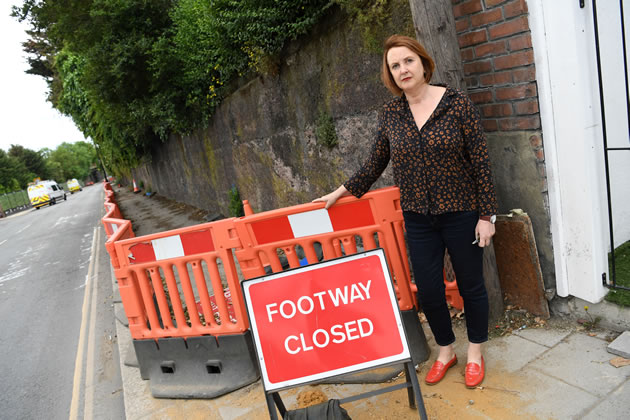Noise, vibration and pollution becoming unbearable for residents

Thomas lives on the edge of the HS2 Old Oak Common site. Picture: Darren Pepe
|
Constant shaking from HS2 construction work has East Acton residents describing a “living hell”, with some fearing for the structural safety of their homes.
One mother living on Wells House Road said the air pollution coming from the Old Oak Common site had seen her 12-year-old son hospitalised with breathing difficulties and put on oxygen, despite not having asthma.
Meanwhile, a 155-metre-long, three-metre-high concrete retaining wall supporting many of the gardens on the road is becoming a serious safety concern, with an engineering report saying it is in poor condition, and needs shoring up.
The concerns have prompted one local councillor to suggest the road below it, Old Oak Common Lane, should be taken down to one lane to protect motorists. A letter from HS2 meanwhile warns some of the cinder-block structures built above the wall appear unsafe, and could collapse onto the pavement below. There are plans to shore up the wall with large concrete slabs, but who is responsible for the wall itself remains unclear, with Ealing Council and HS2 both saying it’s the others responsibility.
Despite there being big questions asked, for many of the residents it’s the constant noise, vibrations, and lack of communication from HS2 that’s creating the biggest stress.

Demolition work going on at the HS2 Old Oak Common site. Picture: Darren Pepe
Thomas, who asked only to be identified by his first name, lives 15 metres from the hoardings and 25 metres from demolition rubble, meaning he receives the brunt of the noise. Since March last year, he said he had endured earthquake-like shaking from 8am that could last hours at a time as workmen drill into the ground, hauling out large concrete slabs of old foundations. He said he has seen cracks appear in his home, some of his doors now stick, and his relationship and his work as a freelance video producer has suffered.
He said: “The banging’s what gets into your brain.”
“Whenever they drive around on this rubble that also gives us tremors in the house.”
The sound insulation offered – secondary glazing which fits into the interior of windows – does not fit Thomas’s home, but he said no alternative had been offered.
HS2 said where there were particular constraints they had worked with the residents to come up with a workable solution.
Thomas said many residents had sold up, and the homes picked up by landlords who turn them into cheap multi-occupancy homes, which had encouraged vagrancy and litter in the street.
Thomas said: “When I moved in it was a really nice street to leave in, really nice community feel, kids playing in the streets. That’s over now.”
He described the triangular road as being an “oasis” in the industrial area, but with current demolition work expected to continue to March 2020, and Old Oak Common station scheduled to open in December 2026, there is no immediate end in sight.
On the expected time frame, Thomas said: “We all know what happened to Crossrail and this is a bigger project.”
Thomas said he would like more understanding and effort on the part of HS2.
“We just want what’s right and reasonable.”
Amanda Souter is the head of the residents’ association, and her home is one of those with a garden that ends at the three-metre-high retaining wall.

Amanda Souter, head of the residents association for Wells House Rd. Picture: Darren Pepe
An engineering report into the wall states it is over 100 years old, and notes defects in the concrete, ranging from small cracks to honeycombing, severe weathering and spalling.
It reads: “The surface of the worst areas is friable and loose with pieces of concrete ready to fall away.
The report notes there had been some repairs to the surface but these had been poorly executed and would ultimately fall away, and that there is no evidence of steel reinforcement or drainage holes.
It goes on, “The effect of the deep weathering on the overall stability of the immediately surrounding structure could not be established.”
Some areas showed cracks that suggested the wall was falling, and the report said the footpath should be closed and the wall shored up to ensure its stability.
A letter was shown to the Local Democracy Service from HS2 to Ealing Council’s Transport Planning Service Manager.
Dated September 2018, it notes there were a number of structures built above the wall which “appear unsafe”, and “pose an imminent risk to the highway and public safety, not least by either in whole or in part falling onto the highway”.
The letter continues: “Although we have no responsibility for the wall our contractor CSjv has placed temporary barriers on the footpath to prevent pedestrians walking next to the wall in certain places.”
“This of course cannot prevent any damage or injury occurring to users of the road from falling debris.”
The letter notes that HS2 cannot interfere with the structures, some of which are built of cinder blocks, and the company did not know if valid consents were held for them.
A separate letter to residents from HS2 said a technique called “reflectorless monitoring” had shown varying degrees of movement within the wall between December 2018 and March 2019.
Waist-high barriers have been put in place on the street below the wall and a stairway down from Wells House Road has been blocked off.
Ms Souter said residents had been given a letter of assurances from the House of Commons that the wall would be shored up if found to be dangerous, but this had not happened yet.
It remains unclear whether these assurances apply now, or only when HS2 conducts work closer to the wall.
If the retaining wall were to collapse, Ms Souter said: “our houses and our gardens would go with it”.
Who is responsible for the wall remains unclear.
An Ealing Council spokesperson said the council were supporting HS2 in efforts to determine the exact condition of the retaining wall.
They said: “The planned works to install concrete blocks are designed to stabilise the wall and protect passers-by from any risk of collapse.
“Once in place, this will allow a more detailed assessment of the wall. The HS2 Act contains a commitment to resolve any issues associated with the wall.”
HS2 maintains the wall is not HS2’s responsibility as it does not currently form part of the works, and the current demolition operations does not affect the condition of it.
One councillor is concerned enough about the effect of the shaking to suggest one lane of Old Oak Common Lane school be shut.
Councillor Kate Crawford said she would be asking the local authority to look at the buildings on the edge of the retaining wall to determine if they should be brought down.
She said: “The road is very narrow, has a very narrow pavement, and anything that falls from the top of that wall could easily, if it’s windy, blow onto the road.”
Mrs Crawford echoed residents’ concerns that communication with HS2 had been difficult.
She said: “If there’s a risk, I obviously have concerns there are tremors in the houses with all the digging, and it is going to get worse.
“It could obviously disrupt, not only the wall, but the foundations of the properties.”
“Those properties have hardly any foundations anyway, and I do not know what is under those houses.”
This was a concern echoed by Ms Souter, who said Wells House Road got its name from historic wells on the site.
She said one neighbour’s garden was showing signs of subsidence, and asked for surveys to be conducted on the homes and the land they sat on.
Existing reports suggest the aquifers are in the chalk layer which is about 100m below ground, and should be unaffected by HS2 work.
Ms Souter echoed that the neighbourhood feeling was being eroded by mixed occupancy flats being set up in old family homes.
She said she was called out of her home days before when a postman found a man slumped on the garden wall at 10.30am “as if dead”.
She said emergency services went into the house to find four people in one bedroom, with some showing signs of overdose.
Air quality was also a big concern, Ms Souter said, despite HS2 deploying sprinklers to reduce the amount of particles in the air.
She said the company had given them electric filters to clean the air coming in, but she was afraid to run it too often because of the price for electricity.
She said: “I myself have had a cough, and a throat infection and eye infections all year.”
Ms Souter said she was also being treated for pneumonia.
She accused HS2 of neglected the residents because they weren’t seen as affluent, and few would have the budget for lawyers or specialists.
Several resident’s children had suffered breathing difficulties, she said, even if their children weren’t asthmatic.
Mary is the mother of one of these boys. Her 12-year-old son Jack was playing basketball on the street on a Friday a few weeks before, she said, when he suddenly ran in, “bright red and panicking because he literally couldn’t breath – he was gasping for breath”.
She called emergency services and was told to get her son to an emergency room. She said, “[I felt] shock and surprise obviously, but also then anger, because I knew deep-down this wasn’t anything wrong with him.”
She said doctors couldn’t track the cause, because he didn’t have asthma, but he was given an inhaler to open his airways if it happened again.
“He was worried to go out and play again in case it happened.”
“It coincided with the huge amounts of vibration we’ve had on our street.”
Now Mary said she was concerned her son’s lungs were being damaged while they were still developing.
Jack has since had three more attacks, Mary said, but never when he was playing at school, only in the street at home.
A HS2 spokesman there were “numerous mitigation measures” on the site and air quality was monitored on the boundaries of the sites, which is reported monthly to the local authorities.
He said: “All works undertaken by HS2 Ltd and our contractors are carried out in accordance with our Code of Construction Practice, and we do all we can to minimise the impacts of construction work.”
“We understand that people along the route are concerned about activity in their area. Our community engagement teams regularly talk and listen to the local residents and businesses, and we hold engagement sessions in the area to make sure they are up-to-date with HS2’s construction work.
He stressed the work at Old Oak Common would transform the area, unlocking thousands of new jobs and create new homes around the new transport hub.
He said: “As well as creating a vital new railway, HS2 will connect eight of Britain’s ten largest cities and support economic growth across the country.
There were also weekly drop-ins locally at The Collective, a nearby venue on Victoria Road, where residents can speak to their local engagement manager about any issues of concern.
For Mary, she said she just wanted her phone calls and emails answered, and her concerns over her son’s symptoms responded to.
She said: “We hear nothing – nothing.”
Ged Cann - Local Democracy Reporter
June 6, 2019